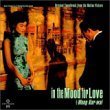Caught up with updating the template for this blog so this is an overdue post. By the way,
A Guy's Moleskine Notebook just turned one month old yesterday with over 300 readers. I wish to express my gratitude to everyone who has checked out the blog. The latest revamp to the site is the incorporation of
LibraryThing | Catalog your books online. This is almost like a dream come true when I recently discovered the catalog helper from other literary blogs. Basically I can catalogue my entire book collection through this service, which tabulates books alphabetically by titles, genres, or authors' last names. Since LibraryThing is an online reader community, every member catalogs together, I can use the shared network to find people with similar libraries, get suggestions from people with my tastes. It's great fun to watch my
graphical shelf of books to grow and immediately links to those who share my titles. LibraryThing also allows me to tag my titles
literature,
gay studies,
history,
philosophy and so forth. One can be creative about these tags. For example, one person might tag
War and Peace "Russian lit", while another tags it "religious, philosophical," and still another "novel I can never finish>" To add more style to my blog, I can copy-and-paste the script to include a wiget showing random books of my library on the blog. To share a bit of fun stat, here are the books in my library that are most unique and eclectic in LibraryThing:
Naguib Mahfouz: The Day the Leader was Killed (0)
Naguib Mahfouz: The Beggar, The Thief and the Dogs, Autumn Quail (2)
Grace Tiffany: Will (2)
Michael Thomas Ford: Alec Baldwin Doesn't Love Me and Other Trials from My Queer Life (2)
Charles Higham: The Civilization of Angkor (2)
Cao Xueqin: The Debt of Tears, Dream of the Red Chamber Vol.4 (3)
Michael Lowenthal: The Same Embrace (3)
Dai Sijie: Mr. Muo's Travelling Couch (4)
Yu Hua: To Live (4)
Cao Xueqin: The Dreamer Wakes, Dream of the Red Chamber Vol.5 (4)
Colm Toibin: The Story of the Night (5)
( ) denotes the number of LibraryThing member who shares the same title with me. I'm very surprised that after the smash-hit debut
Balzac and the Little Chinese Seamstress, Dai Sijie does not kick off a domino effect for his latest release, which came out last fall. Egyptian Nobel prize winner Naguib Mahfouz, who is most known for his Cairo Trilogy, is also not very well-read among LibraryThing readers. The last two volumes of Dream of Red Chamber also reap a meager audience. Maybe the Chinese epic is too long and philosophical to engross a lasting readership. Now the top five shared titles in my library:
Jane Austen: Pride and Prejudice (997)
J.D. Salinger: The Catcher in the Rye (927)
Gabriel Garcia Marquez: One Hundred Years of Solitude (591)
Charles Dickens: Great Expectations (511)
Arthur Golden: Memoirs of a Geisha (499)
What can I say to this? All classics but one - a toast to Arthur Golden. How do my all-time favorite reads fare in this community?
Umberto Eco: The Name of the Rose (469)
Fyodor Dostoevsky: Crime and Punishment (373)
Fyodor Dostoevsky: The Brothers Karamazov (227)
Mikhail Bulgakov: The Master and Margarita (213)Alan Hollinghurst: The Line of Beauty (88)














